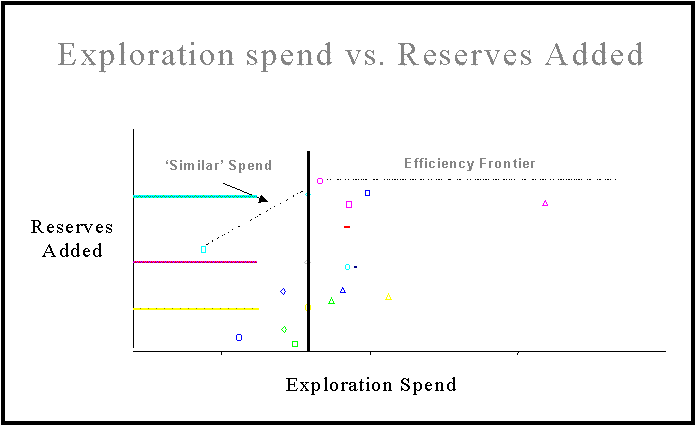
Cost issues and technology are forcing oil companies to re-evaluate the role of Information Management (IM) in their organizations. The push is to develop strategies that explicitly add value to the business. Such strategies will be based on just in time data delivery to asset teams, and will be achieved with minimal in-house data management. The basis for such a radical conclusion is Wilson's observation that companies that are 'good' at data management are not necessarily good at business. Wilson's consulting company, Paras has attempted to analyze exactly how data management adds value to the business. Wilson has likened this to the marketing executive’s dilemma. He knows that 50% of the advertising budget it wasted, but doesn't know which 50% it is.
efficiency frontier
Paras' analysis is based upon an analysis of the efficiency of investment - in both general E&P and on IT. The figure below shows a comparison of reserves added per license as a function of IT spend for a variety of North Sea permits. There is great dispersion in the data points suggesting that costly IT does not necessarily add value to a company. Furthermore, an ‘efficiency frontier’ is soon reached beyond which more spend does not bring more reserves. Other analyses suggest that IT spend is mainly driven by head count. Paras, in collaboration with Exprodat have further analyzed the decision making process in E&P. They break down the E&P process into into 'technical' and decision making processes. They argue, and many G&G-ers will take issue with this, that the technical interpretation process is no longer a differentiator between oil and gas companies. It is the decision making process that sorts the men from the boys in the E&P sweepstakes. Wilson likens the interpretation process to a production line 'manufacturing' prospects and proposes Taylorian metrics such as number of prospects generated per interpreter-month as efficiency measures.

Vexed
The issue of data and information management must now be viewed in the context of whether it is helping to reduce the cycle time for the prospect production process. If this is not the case, then we should not be spending money on it. One vexed area for efficiency seekers, as PDM readers are well aware, is the area of interoperability. Wilson believes that much software deployed in the E&P shop will never be integrated and regards this as a barrier to efficiency. The reason? Commercial pressures and lack of vendor cooperation. The solution? Single vendor providers or at least constrained multi-vendor environments such as implemented by Conoco, Mobil and Vastar, or most recently by BP Amoco.
emotional
A related problem is that of burgeoning Application portfolios - Wilson believes that interpreters are too emotionally attached to their software and that efficiency gains are to be achieved by chopping out those underused applications.
over-scienced
Wilson maintains that much E&P is 'over-scienced', which has led to these expanding portfolios. Wilson has examined the seismic interpretation process closely and sees this as "3D all the way". A minimum IM infrastructure has been defined to support this. Many companies have 2 or 3 mapping programs and as many cross section generators. They may further have similar software running of UNIX and NT. All this would benefit from serious rationalization. Choose an integration platform, and retreat from the 'best of breed' ideal.
RIP CDS
One major target for efficiency gains is the Corporate Data Store (CDS). Here Wilson is unequivocal. The CDS is dead! Or rather should be reined-in and focussed around a high-level repository of corporate knowledge. The main reason for the failure of the CDS? The fact that there is only ever one data flow, from the CDS to the projects. Data just does not go back into the CDS and add value. So if it is incapable of capturing the value added data, why not get rid of it altogether. All the bulk data management should be managed by off-site third parties. Where will all the money saved be spent? On the high added-value end of the business - the Decision Support. Other analyses performed by Paras compare headcount with success in terms of reserves added. Wilson suggests serious under-achievement in this field, if people are not drilling wells or interpreting seismic, why have them?
DISKOS
For Wilson, the prime example of an efficiency-producing project is the Norwegian Diskos which he describes as "a phenomenal success". Other pointers to the new world order - capable suppliers like GeoQuest providing IT and Data Management support and IHS with ‘just in time’ data. What is left to keep in house? The knowledge, textual information tracking the decision process, the context in which decisions are taken and most important of all, the Knowledge Base, back populated with mission-critical information from the projects.
Click here to comment on this article
If your browser does not work with the MailTo button, send mail to
pdm@oilit.com with PDM_V_3.3_9907_4 as the subject. © Oil IT Journal - all rights reserved.